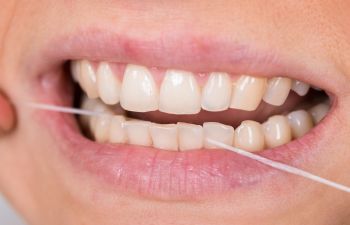Have you been flossing? It is the dreaded question we get at the dentist. To answer the question truthfully, you can’t count the two times you flossed right before your appointment. If you are like most Americans, you are failing to uphold your flossing job. In fact, more than half of the United States population admits to not flossing regularly, and 20% say that don’t floss at all!
The Benefits of Flossing
Flossing is recommended on a daily basis for good reason. Along with brushing your teeth, flossing is what keeps your mouth healthy. Contrary to what many patients assume, flossing isn’t optional. In fact, if you don’t floss, you are missing nearly 35% of your tooth surface that your toothbrush can’t reach. Removing bacteria, plaque and food debris in between your teeth can play a large role in preventing gum disease, cavities and bad breath.
What if My Gums Bleed When I Floss
We get this a lot. Patients may try to floss at home but when they see pink in the sink, they shy away in fear that something is wrong. The truth is, bleeding gums after flossing is typically a natural response and a warning sign that you need to be flossing more – not less!
When the tissues of body are injured or irritated, the natural immune response is to send fluids to the area to help it heal. Think of getting a splinter in your finger. The area swells, becomes sore and may even bleed when the splinter is removed. The same inflammatory response occurs within the gums.
It is common to have swelling, soreness or bleeding in the gums after flossing. Your body will often try to irrigate the food, plaque and bacteria within your gums with inflammation and bleeding. When we then mechanically stimulate our gums by flossing, it triggers this inflammation response. As the gums get cleaner and healthier, however, flossing should not trigger a lot of bleeding.
5 Reasons to Start Flossing
Not sure you are going to add the task to your daily hygiene routine. Consider these valued reasons to start flossing now:
- Flossing removes plaque from two of the five surfaces of a tooth. We know that plaque is the leading cause of decay and periodontal disease.
- Flossing promotes better overall health. When the gums are in good health, there is less risk of stroke, diabetes, rheumatoid arthritis, respiratory disease and heart disease.
- Flossing is a low-cost, efficient tool to a healthy mouth. Such a small thread of floss can offer big rewards towards your dental health.
- Flossing improves the appearance of your smile. Flossing contributes to better breath, whiter teeth and a more confident-smile.
- Your dentist can tell if you haven’t been flossing!
Why Aren’t You Flossing?
Is it lack of time, laziness or poor dexterity? At Grateful Dental, we help patients understand that flossing can be a simple task. In fact, there is more than one way to floss. If traditional flossing thread is too cumbersome for you to maneuver, consider a handheld water flosser or Y-shaped floss holder. These are perfect options for young kids or senior adults who don’t have enough coordination to use conventional flossing methods. You can also choose from a variety of flavors when it comes to floss. Lastly, you can choose to floss during other daily activities, such as in the shower or while you are watching TV. It should only take 2-3 minutes out of your 1,440-minute day!
If you are still unsure about the proper flossing tools or techniques, don’t be afraid to ask. Our hygienists will gladly go over the process with you. Don’t make the mistake of believing that brushing your teeth and seeing your dentist twice a year is all you need for a healthy smile. Flossing plays an important role towards gum disease prevention, which we know is the leading cause of tooth loss in the United States. To schedule your routine dental checkup or learn more about flossing, contact Grateful Dental in Marietta.














